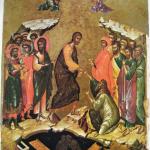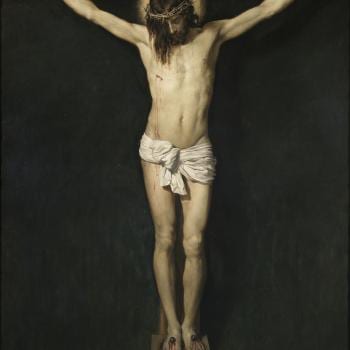
We are meant to feel that his life was in that sense a sort of love affair with death, a romance of the pursuit of the ultimate sacrifice. From the moment when the star goes up like a birthday rocket, to the moment when the sun is extinguished like a funeral torch, the whole story moves on wings with the speed and direction of a drama, ending in an act beyond words. Therefore the story of Christ is the story of a journey, almost in the manner of a military march; certainly in the manner of the quest of a hero moving to his achievement or his doom. It is a story that begins in the paradise of Galilee, a pastoral and peaceful land having really some hint of Eden, and gradually climbs the rising country into the mountains that are nearer to the storm-clouds and the stars, as to a Mountain of Purgatory. He may be met as if straying in strange places, or stopped on the way for discussion or dispute; but his face is set towards the mountain city. That is the meaning of that great culmination when he crested the ridge and stood at the turning of the road and suddenly cried aloud, lamenting over Jerusalem. Some light touch of that lament is in every patriotic poem or if it is absent, the patriotism stinks with vulgarity. That is the meaning of the stirring and startling incident at the gates of the Temple, when the tables were hurled like lumber down the steps, and the rich merchants driven forth with bodily blows; the incident that must be at least as much of a puzzle to the pacifists as any paradox about non-resistance can be to any of the militarists. I have compared the quest to the journey of Jason, but we must never forget that in a deeper sense it is rather to be compared to the journey of Ulysses. It was not only a romance of travel but a romance of return; and of the end of a usurpation. No healthy boy reading the story regards the rout of the Ithacan suitors as anything but a happy ending. But there are doubtless some who regard the rout of the Jewish merchants and money-changers with that refined repugnance which never fails to move them in the presence of violence, and especially of violence against the well-to-do. The point here, however, is that all these incidents have in them a character of mounting crisis. In other words, these incidents are not incidental. When Apollonius the ideal philosopher is brought before the judgment seat of Domitian and vanishes by magic, the miracle is entirely incidental. It might have occurred at any time in the wandering life of the Tyanean; indeed, I believe it is doubtful in date as well as in substance. The ideal philosopher merely vanished, and resumed his ideal existence somewhere else for an indefinite period. It is characteristic of the contrast perhaps that Apollonius was supposed to have lived to an almost miraculous old age. Jesus of Nazareth was less prudent in his miracles. When Jesus was brought before the judgment-seat of Pontius Pilate, he did not vanish. It was the crisis and the goal; it was the hour and the power of darkness. It was the supremely supernatural act of all his miraculous life, that he did not vanish.
Every attempt to amplify that story has diminished it. The task has been attempted by many men of real genius and eloquence as well as by only too many vulgar sentimentalists and self-conscious rhetoricians. The tale has been retold with patronizing pathos by elegant skeptics and with fluent enthusiasm by boisterous best-sellers. It will not be retold here. The grinding power of the plain words of the Gospel story is like the power of millstones; and those who can read them simply enough will feel as if rocks had been rolled upon them. Criticism is only words about words; and of what use are words about such words as these? What is the use of wordpainting about the dark garden filled suddenly with torchlight and furious faces? ‘Are you come out with swords and staves as against a robber? All day I sat in your temple teaching, and you took me not.’ Can anything be added to the massive and gathered restraint of that irony; like a great wave lifted to the sky and refusing to fall? ‘Daughters of Jerusalem, weep not for me but weep for yourselves and for your children!
As the High Priest asked what further need he had of witnesses, we might well ask what further need we have of words. Peter in a panic repudiated him: ‘and immediately the cock crew; and Jesus looked upon Peter, and Peter went out and wept bitterly.’ Has anyone any further remarks to offer? Just before the murder he prayed for all the murderous race of men saying ‘They know not what they do’; is there anything to say to that, except that we know as little what we say? Is there any need to repeat and spin out the story of how the tragedy trailed up the Via Dolorosa and how they threw him in haphazard with two thieves in one of the ordinary batches of execution; and how in all that horror and howling wilderness of desertion one voice spoke in homage, a startling voice from the very last place where it was looked for, the gibbet of the criminal; and he said to that nameless ruffian, ‘This night shalt thou be with me in Paradise’? Is there anything to put after that but a full-stop? Or is anyone prepared to answer adequately that farewell gesture to all flesh which created for his Mother a new Son?
It is more within my powers, and here more immediately to my purpose, to point out that in that scene were symbolically gathered all the human forces that have been vaguely sketched in this story. As kings and philosophers and the popular element had been symbolically present at his birth, so they were more practically concerned in his death; and with that we come face to face with the essential fact to be realized. All the great groups that stood about the Cross represent in one way or another the great historical truth of the time; that the world could not save itself. Man could do no more. Rome and Jerusalem and Athens and everything else were going down like a sea turned into a slow cataract. Externally indeed the ancient world was still at its strongest, it is always at that moment that the inmost weakness begins. But in order to understand that weakness we must repeat what has been said more than once; that it was not the weakness of a thing originally weak. It was emphatically the strength of the world that was turned to weakness and the wisdom of the world that was turned to folly.
***
And as it was with these powers that were good, or at least had once been good, so it was with the element which was perhaps the best, or which Christ himself seems certainly to have felt as the best. The poor to whom he preached the good news, the common people who heard him gladly, the populace that had made so many popular heroes and demigods in the old pagan world showed also the weaknesses that were dissolving the world. They suffered the evils often seen in the mob of the city, and especially the mob of the capital, during the decline of a society. The same thing that makes the rural population live on tradition makes the urban population live on rumor. just as its myths at the best had been irrational, so its likes and dislikes are easily changed by baseless assertion that is arbitrary without being authoritative. Some brigand or other was artificially turned into a picturesque and popular figure and run as a kind of candidate against Christ. In all this we recognize the urban population that we know, with its newspaper scares and scoops. But there was present in this ancient population an evil more peculiar to the ancient world. We have noted it already as the neglect of the individual, even of the individual voting the condemnation and still more of the individual condemned. It was the soul of the hive; a heathen thing. The cry of this spirit also was heard in that hour, ‘It is well that one man die for the people! Yet this spirit in antiquity of devotion to the city and to the state had so been in itself and in its time a noble spirit. It had its poets and its martyrs; men still to be honored forever. It was failing through its weakness in not seeing the separate soul of a man, the shrine of all mysticism; but it was only failing as everything else was failing. The mob went along with the Sadducees and the Pharisees, the philosophers and the moralists. It went along with the imperial magistrates and the sacred priests, the scribes and the soldiers, that the one universal human spirit might suffer a universal condemnation; that there might be one deep, unanimous chorus of approval and harmony when Man was rejected of men.
There were solitudes beyond where none shall follow. There were secrets in the inmost and invisible part of that drama that have no symbol in speech; orin any severance of a man from men. Nor is it easy for any words less stark and single-minded than those of the naked narrative even to hint at the horror of exaltation that lifted itself above the hill. Endless expositions have not come to the end of it, or even to the beginning. And if there be any sound that can produce a silence, we may surely be silent about the end and the extremity; when a cry was driven out of that darkness in words dreadfully distinct and dreadfully unintelligible, which man shall never understand in all the eternity they have purchased for him; and for one annihilating instant an abyss that is not for our thoughts had opened even in the unity of the absolute; and God bad been forsaken of God. – G.K. Chesterton, The Everlasting Man











